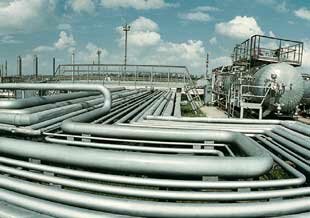TEHRAN -- Materialization of the Nabucco gas pipeline project depends on supplying the needed gas for the pipeline, which seems to be impossible without Iran's participation in the project, analysts say.
The Nabucco gas pipeline project worth €7.9 billion envisages gas supply from the Caspian region to EU countries. Construction of the gas pipeline was scheduled for 2011. The first supplies will be launched in 2014. Maximal capacity of pipeline will hit 31 billion cubic meters per year.
The proposed 3,300-kilometer Nabucco pipeline aims to carry natural gas from Central Asia via Turkey and the Balkan states to Austria, bypassing Russia and Ukraine.
Participants of the project are Austrian OMV, Hungarian MOL, Bulgarian Bulgargaz, Romanian Transgaz, Turkish Botas and German RWE companies. Iranian Oil Minister Gholam Hossein Nozari told FNA last week that Iran's participation in the project would be a must for the materialization of the project because the member states of the project will not be able to produce and supply the gas needed for the project.
Earlier in July, Managing Director of the National Iranian Gas Export Company (NIGEC) Seyed Reza Kassaeizadeh underlined that the Nabucco pipeline project would make no progress without Iran. "It is obvious that Europe needs several gas supplying pipelines…Iran is the main gas supplier in the region and has rich resources, high security and proper infrastructure. In other words, Nabucco pipeline would not be materialized and would remain at the level a plan without Iran," Kassaeizadeh told FNA.
Russian Prime Minister Vladimir Putin said in March that the Nabucco project was not feasible without Iran's involvement. Iran sits on 16 percent of the world's natural gas reserves - second in the world only to Russia. Nabucco consortium managing director Reinhard Mitschek had hinted in early February that the consortium was considering Iran as one of the several starting points for the construction of the pipeline.
Preparations for this project started in February 2002 when first talks took place between Austrian OMV and Turkish BOTA?. In June 2002, five companies (OMV of Austria, MOL of Hungary, Bulgargaz of Bulgaria, Transgaz of Romania and BOTA? of Turkey) signed a protocol of intention to construct the Nabucco pipeline, followed by the Cooperation Agreement in October 2002. In December 2003, the European Commission awarded a grant in the amount of 50% of the estimated total eligible costs of the feasibility study, including market analysis, technical, economic and financial studies.
On 28 June 2005, the Joint Venture Agreement was signed by five Nabucco Partners. Ministerial statement on the Nabucco pipeline was signed on 26 June 2006 in Vienna.
In February 2008, German RWE became a shareholder of the consortium. On 11 June 2008, the first contract to supply gas from Azerbaijan through the Nabucco pipeline to Bulgaria was signed. The President of Azerbaijan Ilham Aliyev confirmed on 29 January 2009, that Azerbaijan was planning to at least double its gas production in the coming five years to supply the pipeline.
Yet, world energy analysts believe that neither Azerbaijan nor any other country can supply the needed gas for the pipeline without Iran's partnership in the plan.



